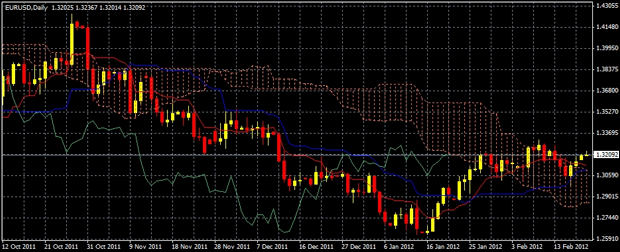A more technical look at the markets from InterTrader.
There are increasing signs that Germany is making emergency preparations in case the country feels it has no other choice but to leave the Euro and go back to the Mark.
Although Angela Merkel is officially 100% committed to the ideal of a united Europe, behind the scenes Germany seems to be preparing for the possibility that it might have to abandon the Euro.
The reason for this is the ongoing debt crisis in some of the smaller EU nations. This week Eurozone finance ministers met to make a decision on whether Greece has satisfied the condition for its next bailout loan.
It now seems that Athens will receive the €130 billion in bailout money and so should be able to stave off bankruptcy in mid-March, when the next large repayment on its government debt has to be made.
Nevertheless, Harvard economist, Ken Rogoff, is of the opinion that Greece is going to default, no matter what.
Germany’s Conundrum
The problem for Germany is that France wants to save the Euro at all costs, even it if means borrowing even more to re-capitalise the European Rescue Fund.Germany, on the other hand, is simply no longer prepared to accept the responsibility for smaller countries’ debts, without gaining more control over their fiscal affairs.
The overall EU debt/GDP ratio is a relatively manageable 88%, so with proper central fiscal control there is no reason for the EU to go down. However, this would come with a price tag in the form of individual countries losing control over their fiscal budgets.
German Choices
In the end Germany might only have two choices:a) Stay in the Euro and accept the risk that it could have to play a significant role in funding the debts of struggling economies, such as Greece, Italy and Spain.
b) Leave the Euro and face the consequences.
The Cost of Leaving the Euro
If Germany leaves the Euro, some economists predict that the forex spread betting markets would see the value of the single currency tumble by as much as 50%. The Mark, on the other hand, would rise significantly against the Euro.This might not be what German industry wants, however. The country’s exports would immediately become more expensive, which would have a negative effect on the balance of trade with the rest of the world. Cheaper imports would put additional pressure on domestic manufacturing industries.
Loans to other countries, granted in Euros, would also immediately drop in value, meaning Germany could, in real terms, get back considerably less than their original value.
If countries such as Spain, Italy and Greece remained in the EU, it would mean their products and services would immediately become cheaper relative to those of their German counterparts, which would have the effect of stimulating their economies.
Trading Opportunities
Germany’s departure could be a goldmine of opportunities for spread betting account holders. The declines seen in the chart below, between the end of October last year and the middle of January this year, would most likely continue.The Euro would be virtually certain to drop against the Mark and other major currencies for a prolonged period of time, with the Euro – Dollar spread betting market falling as a result.
Such a move could create an opportunity for going long of the Mark and the US Dollar, whilst simultaneously going short of the Euro.

Good luck and happy trading
Shai Heffetz, InterTrader
(Original article written 21 February 2011).
The contents of this report are for information purposes only. It is not intended as a recommendation to trade. Neither InterTrader nor CleanFinancial.com accept any responsibility for any use that may be made of the above or for the correctness or accuracy of the information provided.
Spread betting and CFD trading carry a high level of risk to your capital and you may lose more than your initial investment. Spread betting and CFD trading may not be suitable for all investors. Only speculate with money that you can afford to lose. Please ensure you fully understand the risks involved and seek independent financial advice where necessary.

